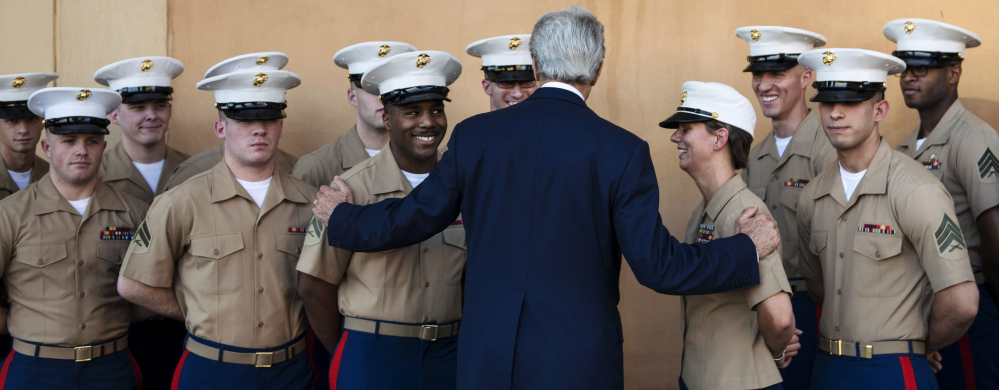BAGHDAD — As insurgents grabbed another key town from Iraqi forces, U.S. Secretary of State John F. Kerry made an unannounced visit to Baghdad on Monday to push for the speedy formation of a new government that could pull the country back from the brink of sectarian war.
Kerry met with Prime Minister Nouri al-Maliki and senior Shiite Muslim, Sunni Muslim and Kurdish leaders during the highest-level visit by a U.S. official since Iraq’s crisis began.
Although Kerry did not call on the divisive al-Maliki, a Shiite, to step down, he urged leaders not to delay in forming a new government that shares more power with minority Sunnis and Kurds and bridges the sectarian divides that have fueled the insurgency.
“It is a moment of decision for Iraq’s leaders,” Kerry said at a news conference. “Iraq faces an existential threat, and Iraq’s leaders have to meet that threat.”
As Kerry held talks, Iraqi security officials said that government forces ceded control of the northern city of Tall Afar to insurgents led by the Islamic State of Iraq and Syria, or ISIS. It was the latest key town to slip from government hands.
Iraqi military spokesman Qassim Atta said that “terrorists” had surrounded the city of 200,000 people and that army troops made a strategic retreat.
“There are many choices for security forces to attack,” Atta said. “The withdrawal from Tall Afar is to plan for those attacks, not because of defeat.”
A decade ago, U.S. forces launched a major offensive to retake Tall Afar from the militant group al-Qaida in Iraq, sending 1,200 troops to conduct a house-by-house clearing operation that eventually flushed out the militants. Now in the hands of ISIS, an al-Qaida splinter group, the town and its airport are considered critical because of their location along a strategic corridor to neighboring Syria.
Sunni militants led by ISIS drove government forces out of a series of border crossings over the weekend, expanding their control over a wide swath of territory that extends from Syria across northern Iraq to within an hour’s drive of the capital, Baghdad.
On Monday, Iraqi officials said they had sent troops to the western town of Haditha, in Anbar province, to support local Sunni tribes against the insurgents. Haditha is seen as key because it is the site of Iraq’s biggest dam, which controls the flow of water to the Euphrates Valley, the country’s breadbasket.
Anbar, a vast and predominantly Sunni province along the Syrian border, is almost completely in the hands of insurgents, who have also seized border crossings between Iraq and Syria.
U.S. officials said Kerry – who also met with the Sunni parliament speaker, Usama Nujaifi; Foreign Minister Hoshyar Zebari, who is Kurdish; and other leaders – pressed the Iraqis on the importance of presenting a united front against the insurgents.
Iraq’s new parliament, elected in April, is due to hold its first session June 30, with a prime minister to be named by mid-August, according to constitutional guidelines.
President Barack Obama has said he would send up to 300 military advisers to help Iraqi forces battle the militants, who have also seized the strategic northern city of Mosul. Obama is also said to be considering targeted airstrikes.
But Obama administration officials do not believe that the Iraqi military can retake significant amounts of the territory without the installation of an inclusive new government.
Last week, Iraq’s most influential cleric, Grand Ayatollah Ali Sistani, called on Iraqi leaders to form an “effective government” that would overturn “past mistakes.” Although Sistani did not mention al-Maliki by name, the remarks were seen as a rebuke of the two-term prime minister because the revered Shiite cleric is usually cautious in his political pronouncements.
Although U.S. officials insist that Iraqis must choose their leaders, the Obama administration is said to be seeking a way to have the divisive leader replaced, probably with another politician from Iraq’s Shiite majority who would be acceptable to Sunnis and Kurds.
Al-Maliki, whom the George W. Bush administration plucked from near-obscurity to support for prime minister eight years ago, has amassed near total control of Iraqi security agencies, installed allies in key judiciary positions and jailed hundreds of Sunni citizens and political figures without trial.
But al-Maliki, whose political bloc won a plurality of seats in the April elections, does not appear ready to step down. Late Monday, his office issued a statement saying the largest parliamentary bloc — his State of Law coalition — must supply the prime ministerial candidate, according to the constitution.
His supporters say it would be dangerous to replace him while the country is at war with ISIS.
“During World War II, America gave a president four terms,” Abbas Bayati, a lawmaker from al-Maliki’s Dawa Party, said before Kerry’s visit. “During a war you cannot change a leader.”
Send questions/comments to the editors.



Success. Please wait for the page to reload. If the page does not reload within 5 seconds, please refresh the page.
Enter your email and password to access comments.
Hi, to comment on stories you must . This profile is in addition to your subscription and website login.
Already have a commenting profile? .
Invalid username/password.
Please check your email to confirm and complete your registration.
Only subscribers are eligible to post comments. Please subscribe or login first for digital access. Here’s why.
Use the form below to reset your password. When you've submitted your account email, we will send an email with a reset code.